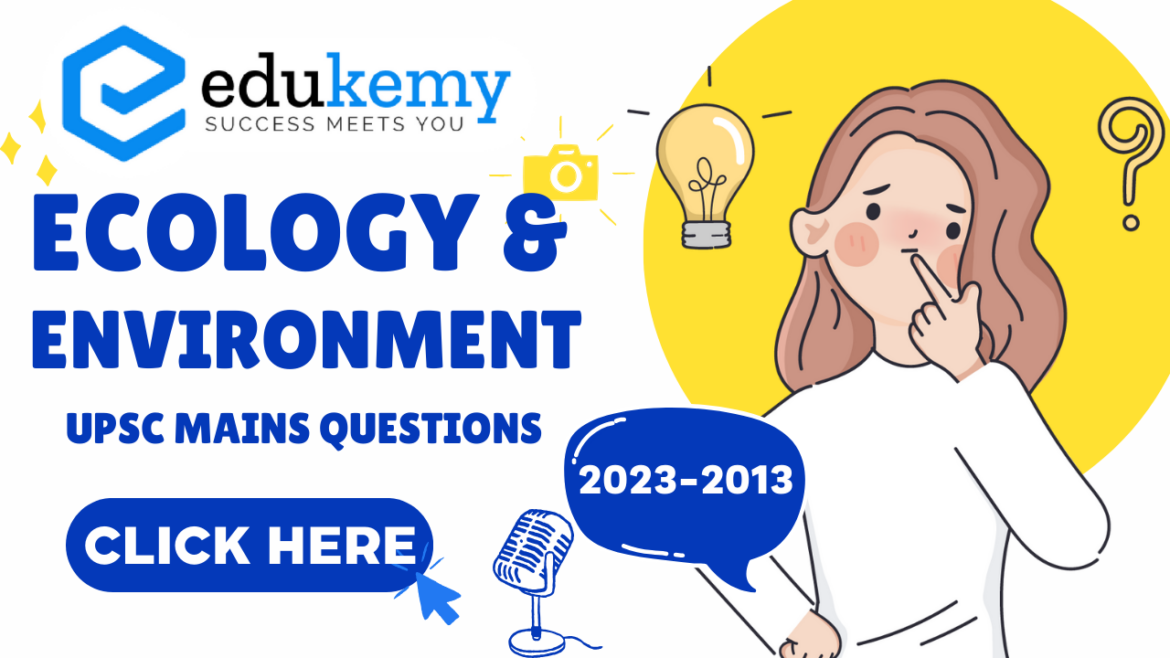Subject-wise Environment and Ecology questions in the UPSC Mains examinations from 2013 to 2023 have provided a comprehensive insight into the intricate interplay between human activities and the environment. These questions, spanning a decade, have delved into various dimensions of environmental science, conservation, and sustainable development, reflecting the evolving challenges and priorities in this field. Covering topics such as climate change, biodiversity conservation, environmental policies, and renewable energy, these questions have tested candidates’ understanding of environmental issues and their ability to critically analyze and propose solutions. Over the years, the UPSC has emphasized the importance of environmental awareness and ecological literacy among civil service aspirants, recognizing the pivotal role of administrators in shaping policies for a sustainable future. This retrospective examination of subject-wise Environmental and Ecology questions offers valuable insights into the evolving discourse on environmental governance and underscores the significance of interdisciplinary approaches in addressing complex environmental challenges.
Contents
2023
- What is oil pollution? What are its impacts on the marine ecosystem? In what way is oil pollution particularly harmful for a country like India?
- Comment on the National Wetland Conservation Programme initiated by the Government of India and name a few India’s wetlands of international importance included in the Ramsar Sites.
- The Intergovernmental Panel on Climate Change (IPCC) has predicted a global sea level rise of about one metre by AD 2100. What would be its impact in India and the other countries in the Indian Ocean region?
2022
- Each year a large amount of plant material, cellulose, is deposited on the surface of Planet Earth. What are the natural processes this cellulose undergoes before yielding carbon dioxide, water and other end products ?
- Discuss in detail the photochemical smog emphasising its formation, effects and mitigation. Explain the 1999 Gothenburg Protocol.
- Discuss global warming and mention its effects on the global climate. Explain the control measures to bring down the level of greenhouse gases which cause global warming, in the light of the Kyoto Protocol, 1997.
- Explain the causes and effects of coastal erosion in India. What are the available coastal management techniques for combating the hazard?
2021
- Explain the purpose of the Green Grid Initiative launched at the World Leaders Summit of the COP26 UN Climate Change Conference in Glasgow in November 2021. When was this idea first floated in the International Solar Alliance (ISA)?
- Describe the key points of the revised Global Air Quality Guidelines (AQGs) recently released by the World Health Organisation (WHO). How are these different from its last update in 2005? What changes in India’s National Clean Air Programme are required to achieve these revised standards?
- Describe the major outcomes of the 26th session of the Conference of the Parties (COP) to the United Nations Framework Convention on Climate Change (UNFCCC). What are the commitments made by India in this conference?
2020
- How does the draft Environment Impact Assessment (EIA) Notification, 2020 differ from the existing EIA Notification, 2006?
- What are the salient features of the Jal Shakti Abhiyan launched by the Government of India for water conservation and water security?
- Describe the benefits of deriving electric energy from sunlight in contrast to conventional energy generation. What are the initiatives offered by our Government for this purpose?
- What are the key features of the National Clean Air Programme (NCAP) initiated by the Government of India?

2019
- Coastal sand mining, whether legal or illegal, poses one of the biggest threats to our environment. Analyse the impact of sand mining along the Indian coasts, citing specific examples.
- Define the concept of carrying capacity of an ecosystem as relevant to an environment. Explain how understanding this concept is vital while planning for sustainable development of a region.
2018
- What are the impediments in disposing of the huge quantities of discarded solid wastes which are continuously being generated? How do we safely remove the toxic wastes that have been accumulating in our habitable environment?
- What is wetland? Explain the Ramsar concept of ‘wise use’ in the context of wetland conservation. Cite two examples of Ramsar sites from India.
- Sikkim is the first ‘Organic State’ in India. What are the ecological and economic benefits of Organic State?
- How does biodiversity vary in India? How is the Biological Diversity Act,2002 helpful in conservation of flora and fauna?
2017
- Not many years ago, river linking was a concept, but it is becoming reality in the country. Discuss the advantages of river linking and its possible impact on the environment.
- ‘Climate Change’ is a global problem. How will India be affected by climate change? How Himalayan and coastal states of India are affected by climate change?
2016
2015
2014
2013
- What are the consequences of illegal mining? Discuss the ministry of environment and forests’ concept of “GO AND NO GO” zones for coal mining.
- Enumerate the National Water Policy of India. Taking river Ganges as an example, discuss the strategies which may be adopted for river water pollution control and management. What are the legal provisions for management and handling of hazardous wastes in India?
To get free counseling/support on UPSC preparation from expert mentors please call 9773890604
- Join our Main Telegram Channel and access PYQs, Current Affairs and UPSC Guidance for free – Edukemy for IAS
- Learn Economy for free- Economy for UPSC
- Mains Answer Writing Practice-Mains Answer Writing
- For UPSC Prelims Resources, Click here

